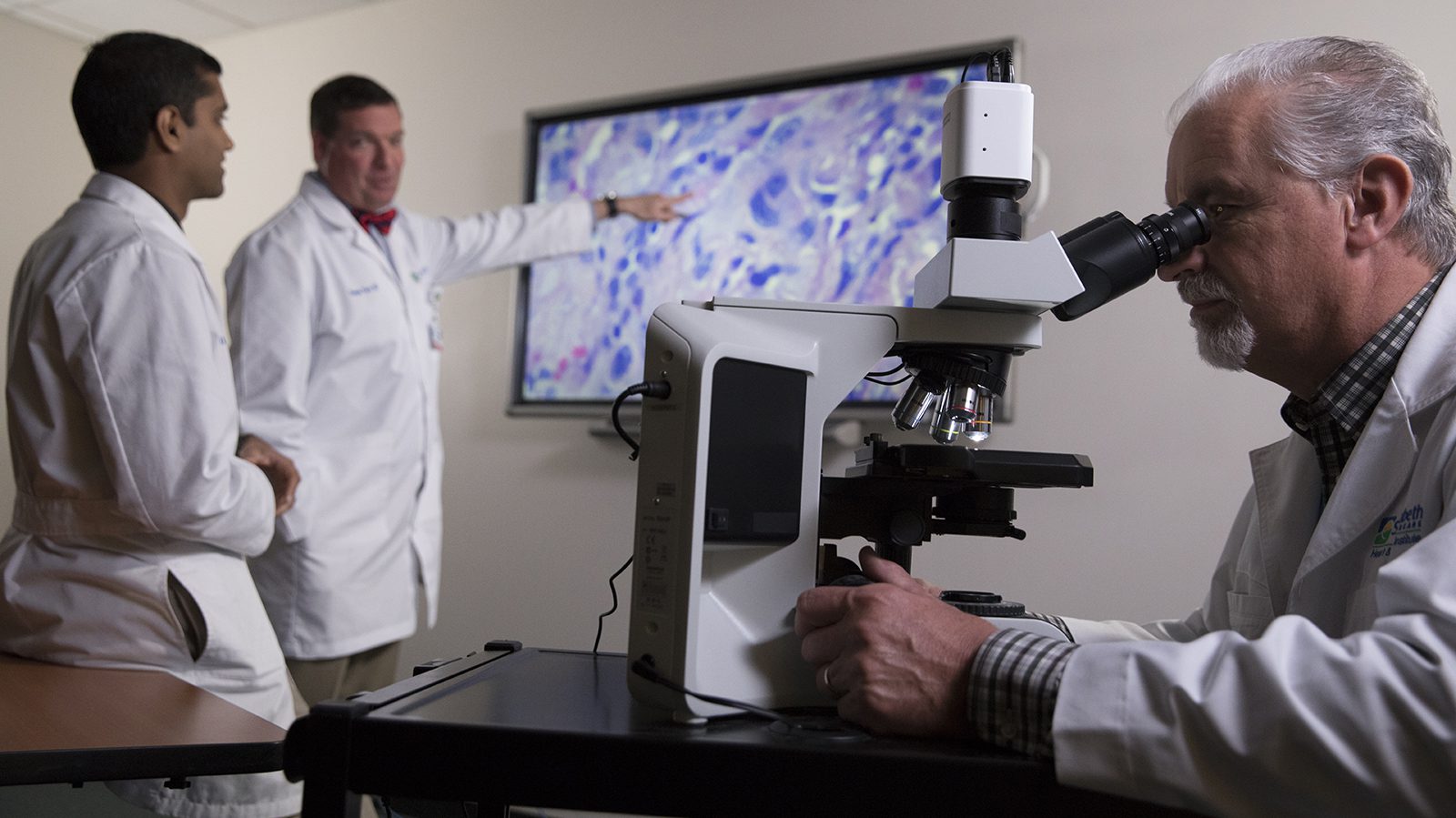Gynecologic Cancer
A cancer diagnosis is life changing. It leaves you with many questions — what’s next, what’s the right treatment path, how will this affect my chances of starting a family and so many more. At St. Elizabeth Healthcare, our gynecologic oncology team is here for you – to answer your questions, provide the most effective treatment options and get you on the road to survivorship.
We build a team around you, one with experts from many different disciplines, including medical oncology, surgical oncology, pharmacy, genetics and more. We have three dedicated physicians, two oncology-certified nurse practitioners and nurse navigators, who are passionate about addressing your needs in real-time and delivering the most effective and compassionate care for you. Everything we do is designed to meet your specific needs.
Gynecologic Cancer Overview
Gynecologic cancers start in a woman’s reproductive organs. The organs include cancer of the cervix, ovaries, uterus, vagina and vulva. Some gynecologic cancers have little to no symptoms. And symptoms are not the same for everyone. At St. Elizabeth, we treat all gynecological cancers, including:

Make an appointment
For more information, please contact your oncologist or the Cancer Care Center at (859) 301-2237, option 2.
In addition to gynecologic cancer, our team also treats benign and pre-cancerous gynecologic conditions, including:
- Cervical dysplasia
- Complex ovarian masses
- Endometrial hyperplasia
- Lynch syndrome
We offer state-of-the-art testing and diagnosis to pinpoint the issue and create a comprehensive treatment plan to fit your needs.
Gynecologic Cancer Screening
Not all gynecologic cancers have screening tests available. That’s why it’s important to maintain regular check-ups and to talk to your doctor if you experience any gynecologic changes or have signs or symptoms.
Currently, cervical cancer is the only type of gynecologic cancer where there is a routine screening Pap test.
Genetic Testing for Gynecologic Cancer
We know that a cancer diagnosis comes with many questions — including whether a family member is at risk for getting cancer too or whether your cancer diagnosis is hereditary. The certified genetic counselors at St. Elizabeth Healthcare are here to help you uncover those answers.
If you have a family history of cancer or are concerned about your risk, genetic counseling is an option to consider. Genetic counseling provides important information to you and your family about cancer risk and risk reduction and prevention.
For patients diagnosed with gynecologic cancer, our hereditary cancer program offers information and resources on inherited disease. Our team recommends that patients diagnosed with ovarian cancer or uterine cancer undergo a genetic evaluation to determine genetic risk. Genetic testing can help determine how a cancer will respond to treatment — and allow us to develop a laser-focused treatment plan specific to your cancer cells’ anatomy.
Gynecologic Cancer Diagnosis
Many of our patients start with their gynecologist, where they undergo routine screenings like a Pap test and gynecologic exam. If your results are abnormal, rest assured that it doesn’t necessarily mean you have cancer. We’ll refer you to the gynecologic oncology team for further evaluation and testing to help us get a precise diagnosis.
If cancer is suspected, you may require additional testing. We offer state-of-the-art diagnostic imaging for gynecologic cancer and other non-cancerous issues, including:
Gynecologic Cancer Treatments
Treating gynecologic cancer requires an individualized approach that takes a wide range of factors into account, including the type and stage of your cancer and whether it’s spread into other areas of your body.
Treatment options may include:
Minimally Invasive Robotic Surgery
If surgery is needed, we use the most up-to-date, minimally invasive approaches, including robotic surgery that offers many benefits, such as:
- Less pain.
- Many procedures can be done as outpatient.
- Shorter length of stay in the hospital.
- Shorter recovery.
- Quicker return to everyday life.
Most of our cancer patients require a combination of surgery, chemotherapy and radiation. Our team will create a comprehensive plan based on your needs.
Gynecologic Cancer Surveillance
If you are diagnosed with cancer, our team looks out for you long after your treatment is over. We carefully monitor your condition for at least five years after your diagnosis and adjust your care if we see any indications that your cancer has returned or spread. Our comprehensive surveillance schedule meets your unique medical needs and can include:
- Follow-up visits
- Occupational therapy
- Physical therapy
- Routine testing
- Specialist appointments
- Support group recommendations
Certified oncology data specialists maintain and update our Cancer Registry. St. Elizabeth keeps a record of all the cancer cases we’ve diagnosed or treated since 2000. We use this database to gather vital information, stay on top of trends, measure the effectiveness of different treatments, and gauge cancer’s impact on our community.


